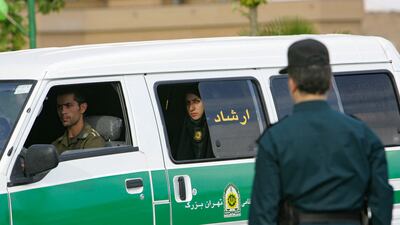Iran's Islamic Revolutionary Guard Corps said on Monday that security forces would show no mercy towards “rioters, thugs and terrorists”.
The IRGC praised Iran's judiciary for its response to continuing protests and encouraged it to swiftly and decisively issue judgments for defendants accused of “crimes against the security of the nation and Islam”.
Its threat came as the status of the country's morality police remained unclear, after an official suggested at the weekend that the unit, whose recent conduct triggered months of protests, was being shut down.
Iran's attorney general had hinted that the operations of the morality police, known as the Gasht-e-Ershad, had been suspended and said there would be a review of dress code enforcement, which forms a major part of the unit's duties.
When asked on Sunday to clarify whether the morality police remained operational, Iranian Foreign Minister Hossein Amirabdollahian did not give a direct answer.
On Monday, a US State Department spokesperson said they would not comment on “vague reports” that the force had been disbanded.
“Nothing we have seen suggests Iran’s leadership is improving its treatment of women and girls or ceasing the violence it inflicts on peaceful protesters,” an official said.
“The people of Iran should be able to peacefully express themselves however they wish, free from intimidation and violence.”
“Be sure that in Iran, within the framework of democracy and freedom, which very clearly exists in Iran, everything is going very well,” Mr Amirabdollahian said during a visit to the Serbian capital of Belgrade.
The morality police arrested an Iranian-Kurdish woman, Mahsa Amini, 22, in September after accusing her of breaching the country's strict dress code for women. She subsequently died in their custody, triggering the current protests.

As of Monday morning, there was no confirmation of the suspension of operations from Iran’s Interior Ministry, which is in charge of the morality police.
State media said that neither Attorney General Mohammad Montazeri nor the judiciary branch of government, which he works for, were responsible for overseeing the force.
Iranian analysts and activists were quick to voice scepticism at reports that Tehran had abolished the force, with some describing it as a ploy by the regime in response to calls for three days of protests from Monday to mark Iran's National Student Day on Wednesday.
“Reports that [Iranian supreme leader Ayatollah Ali] Khamenei’s regime has abolished the 'morality police' are fake news (even regime now denies it),” Kasra Aarabi, the Iran programme lead at the Tony Blair Institute for Global Change, said on Twitter.
“This [disinformation] was propagated today to distract media attention from the 3 days of major protests in Iran, which begin tomorrow. Why did mainstream media ignore this context?”
Hannah Neumann, chairwoman of the European Parliament’s delegation for relations with the Arab Peninsula, dismissed the reports on Sunday.
“Iranian regime announcing the end of 'morality police' is a PR [public relations] stunt. Executions, arbitrary detention and rape are the sad reality, also today. So, I hope the latter will make it into our main news channels every day,” Ms Neumann tweeted.
The Gasht-e-Ershad, Iranian for “guidance patrol”, is a unit of the country's police force that was created under former hardline president Mahmoud Ahmadinejad.
Iran has been gripped by anti-government protests since Ms Amini's death on September 16.
On the same day that Mr Montazeri’s suggested Tehran had suspended the operations of the morality police, hardline Parliament Speaker Mohammad Ghalibaf rejected calls by reformists and protesters to change the constitution to relax the country’s strict dress codes.
“We have no valid document other than the constitution in the country. In the discussions for a new governance, our focus should be on implementing the constitution and not on changing its provisions,” Mr Ghalibaf said on Saturday.
To amend Iran's constitution, a referendum must be organised if backed by two thirds of legislators in parliament or if the supreme leader requests it.
A referendum can be held on any issue except on the country's “non-revisable principles” such as the official religion of the state.


